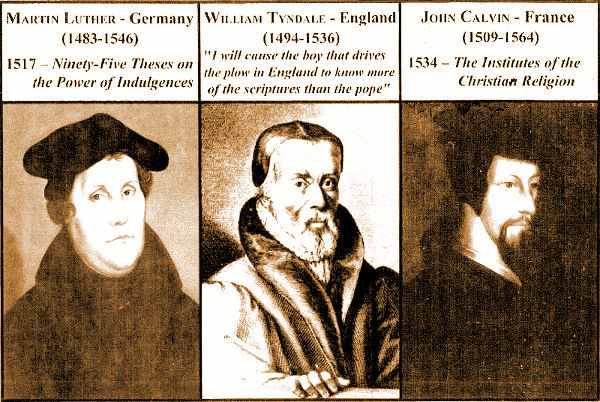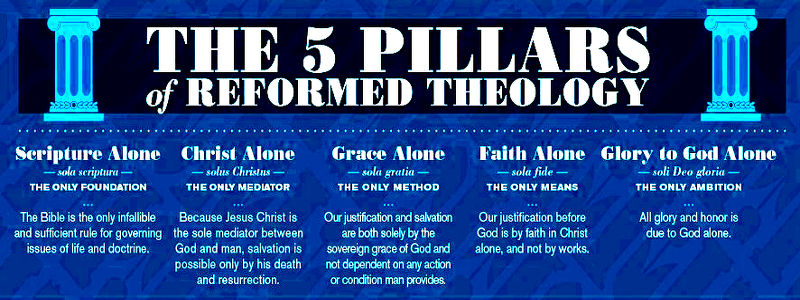Introduction To Protestantism
“For by grace are ye saved through faith; and that not of yourselves: it is the gift of God: Not of works, lest any man should boast.” [Ephesians 2:8-9]

Famous Leaders Of The Protestant Reformation
Introduction
It may appear to Catholics that Protestants don’t agree on anything and can’t be part of the true “Church” of Jesus Christ since they have formed so many denominations. However, this Catholic view of Protestantism is a gross misrepresentation as there is much important, fundamental commonality among Protestant denominations and local Protestant churches.
Areas Of Protestant Agreement
Protestants of all denominations agree on many vital points of doctrine such as:
- the virgin birth of Christ
- the deity of Christ
- the trinitarian nature of God
- the belief that salvation is possible apart from the church of Rome
- forgiveness of sins does not require a human priest
- water baptism does not wash away sins
- the Bible can be interpreted and understood without a system of priests
- the Catechism of the Catholic church has many doctrinal errors in it
- there is no such place as Purgatory, the dead go to either heaven or hell
- the bread in a communion ceremony is just bread. It symbolizes Christ’s body. It does not become His body. If anything, the corporate Church (all true believers) on earth and in heaven is His body, so a person becomes a part of His body when they become born-again.
Disagreement Among Protestants On The Gospel
Unfortunately, not all Protestants agree on what the true gospel of salvation is. In fact, many Protestant denominations believe in a false “free-will” gospel that is no gospel at all and is actually a false doctrine called Arminianism.
Synod Of Dort – Church Council Convened To The Address Arminian Heresy
This disagreement on the Gospel has been going on for centuries and it has been hotly contested at time, including at the Synod of Dort.
The Five Solas or Five Pillars Of The Protestant Reformation

Five major tenets of the Protestant Reformation that have been labeled as the “5 Solas” or “5 Pillars” of that reformation are listed here:
- Sola Scriptura – “Scripture Alone” – The Bible alone is our highest authority.
- Sola Fide – “Faith Alone” – We are saved through faith alone in Jesus Christ.
- Sola Gratia – “Grace Alone” – We are saved by the grace of God alone.
- Solus Christus – “Christ Alone” – Jesus Christ alone is our Lord, Savior, and King.
- Soli Deo Gloria – “To The Glory Of God Alone” – We live for the glory of God alone.
These five solas were formulated to point out the Biblical doctrines that the reformers were identifying as major distinctions between their beliefs, their teachings, IN CONTRAST TO the many unscriptural Roman Catholic Church’s teachings.
Martin Luther’s 95 Theses
Martin Luther who started out his religious life as a Catholic monk, wore out his welcome in the Catholic church when he started questioning and confronting some of their teachings and practices, as he came to see that those Catholic doctrines and traditions were at odds with the Bible. He had wanted to bring “reform” (what he felt was positive and necessary change) to the Catholic Church but was met with strong opposition from Catholic leadership, especially when he started speaking out against abusive practices of the Catholic church that involved robbing the poor by taking advantage of their fears regarding the fate of their deceased loved ones. In 1517, Luther greatly fueled that opposition to his proposed reforms, when he wrote up a list of 95 errors (which could also be termed grievances or or points of dispute) in practice and in doctrine – primarily related to the practice of indulgences (charging people to have a priest get their loved ones out of an imaginary place called Purgatory). Luther nailed that list to the door of a Church in Wittenburg, Germany. At that time, Luther was a professor of moral theology at the University of Wittenberg. That list of errors came to be know as Luther’s “Ninety Five Theses“, also known as his “Disputation on the Power of Indulgences”.
For a complete list of Martin Luther’s 95 Theses, click HERE.
Bibles That Helped Spread The Protestant Reformation
As more and more Bibles were being published in the ordinary language of the people, the Protestant Reformation spread along with the true Gospel of salvation by grace alone through Christ alone. No longer did the corrupt and repressive Roman Catholic Church have a captive audience, nor were they any longer able to keep the sacred Scriptures from the common man.
The Tyndale English Bible Translation
A major accomplishment of the Protestant Reformation was the publishing of the Bible in the vernacular (the common language of the people). In England, this milestone was met when William Tyndale translated and published the Bible in English in 15??. For his magnificent work, the Catholic Church executed him by strangling and then burned his body at the stake.
The Wycliff Bible Translation
The Wycliff Bible was an English translation attributed to the Bible translator John Wycliff, although it is now believed that parts of it were the work of others also.
The Geneva Bible Translation
The Geneva Bible, first published in 1560, is an English translation that was in wide use for many years. It was extremely popular, because it was perhaps the first mass produced English study Bible. It included footnotes, cross references and even maps and introductions to each book of the Bible.
The King James Bible Translation
The most famous and most published English Bible translation of all time is the King James Version (KJV), also known as the “Authorized Version” (AV). The KJV was first published in 1611 in England at the request of King James.
Major Bible Controversies & Issues
The best way to undermine the true Christian faith is to attack is most important foundation – the Scriptures. In our website section called “Bible Versions Analyzed” we examine the many ways that this has been happening over the years since the beginning of the Protestant Reformation. Some of those issues we examine include:
- The King James Only Controversy
- Translation Versus Transliteration
- Paraphrased Bible Versions
- Modern Bible Versions Based Upon Corrupt Greek Manuscripts
- Heretical New Age & Politically Correct Bible Versions
SEE ALSO: